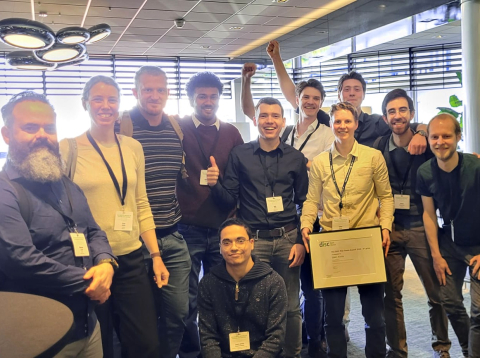Postdoctoral researcher Lizan Kivits has won the prestigious DISC PhD Thesis Award 2024, securing the 3rd prize for her outstanding research. The award was presented by Prof. Dr. Ir. Ming Cao on behalf of the Dutch Institute for Systems and Control (DISC) committee during the annual Benelux Meeting on 20 March 2025.
The award was given for the thesis titled ‘Modelling and Identification of Physical Linear Networks’, which Lizan Kivits defended on 22 February 2024. This research was conducted under the supervision of Prof. Dr. Ir. Paul Van den Hof within the Control Systems group at the Faculty of Electrical Engineering at TU/e.

Key findings
In this thesis, Lizan Kivits introduced a novel approach to describing a large physical system. Instead of treating the system as a whole, it was broken down into individual (symmetric) elements that are interconnected. This method is particularly useful for pinpointing the cause of problems within complex systems.
When an error occurs, it is often easy to detect that something is wrong, but challenging to identify where the fault lies due to the system's complexity. By explicitly describing the interaction structure, the division into subsystems remains intact, allowing for quick and precise localization of faults, leading to faster repairs. The symmetry property of physical elements plays a crucial role in this process.
Impact on fusion energy research
For designing controllers for plasma in fusion energy, the dependencies between various plasma properties are crucial. These dependencies can be represented in a table known as a Design Structure Matrix (DSM), which is based on expert knowledge. The DSM is equivalent to an adjacency matrix that depicts the interaction structure of a network. In other words, the dependencies between plasma properties can also be graphically represented in a network. Algorithms for dynamic networks can identify this interaction structure from experimental data. This means that the DSM of plasma can be identified from data using identification algorithms for dynamic networks.
High quality research
To be eligible for the DISC PhD Thesis Award, candidates must meet DISC's requirements, including obtaining a DISC certificate by earning sufficient study points during their PhD trajectory. Winning this award signifies the high quality of Kivits' research. Lizan Kivits: "This award is a tremendous recognition of the quality of my research. It boosts my confidence in my research abilities and motivates me to continue pursuing my studies."
At DIFFER, Lizan Kivits is working at the Energy Systems and Control group. Read more about this research group.
Author: Lizan Kivits, Rianne van Hoek
Go to the News page.